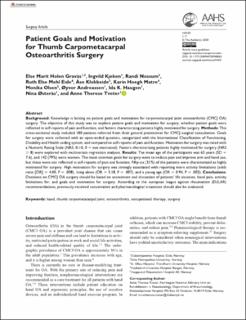Patient Goals and Motivation for Thumb Carpometacarpal Osteoarthritis Surgery
Holen Gravås, Else Marit; Kjeken, Ingvild; Nossum, Randi; Eide, Ruth Else Meh; Klokkeide, Åse; Matre, Karin Hoegh; Olsen, Monika; Andreassen, Øyvor; Haugen, Ida K.; Østerås, Nina; Tveter, Anne Therese
Peer reviewed, Journal article
Published version
Permanent lenke
https://hdl.handle.net/11250/3034501Utgivelsesdato
2020Metadata
Vis full innførselSamlinger
Sammendrag
Background: Knowledge is lacking on patient goals and motivation for carpometacarpal joint osteoarthritis (CMCJ OA) surgery. The objective of this study was to explore patient goals and motivation for surgery, whether patient goals were reflected in self-reports of pain and function, and factors characterizing patients highly motivated for surgery.
Methods: This cross-sectional study included 180 patients referred from their general practitioner for CMCJ surgical consultation. Goals for surgery were collected with an open-ended question, categorized with the International Classification of Functioning, Disability and Health coding system, and compared to self-reports of pain and function. Motivation for surgery was rated with a Numeric Rating Scale (NRS, 0-10, 0 = not motivated). Factors characterizing patients highly motivated for surgery (NRS ≥ 8) were explored with multivariate regression analyses.
Results: The mean age of the participants was 63 years (SD = 7.6), and 142 (79%) were women. The most common goals for surgery were to reduce pain and improve arm and hand use, but these were not reflected in self-reports of pain and function. Fifty-six (31%) of the patients were characterized as highly motivated for surgery. High motivation for surgery was strongly associated with reporting more activity limitations (odds ratio [OR] = 4.00, P = .008), living alone (OR = 3.18, P = .007), and a young age (OR = 0.94, P = .002).
Conclusions: Decisions on CMCJ OA surgery should be based on assessment and discussion of patients’ life situation, hand pain, activity limitations for, and goals and motivation for surgery. According to the european league against rheumatism (EULAR) recommendations, previously received conservative and pharmacological treatment should also be evaluated.

